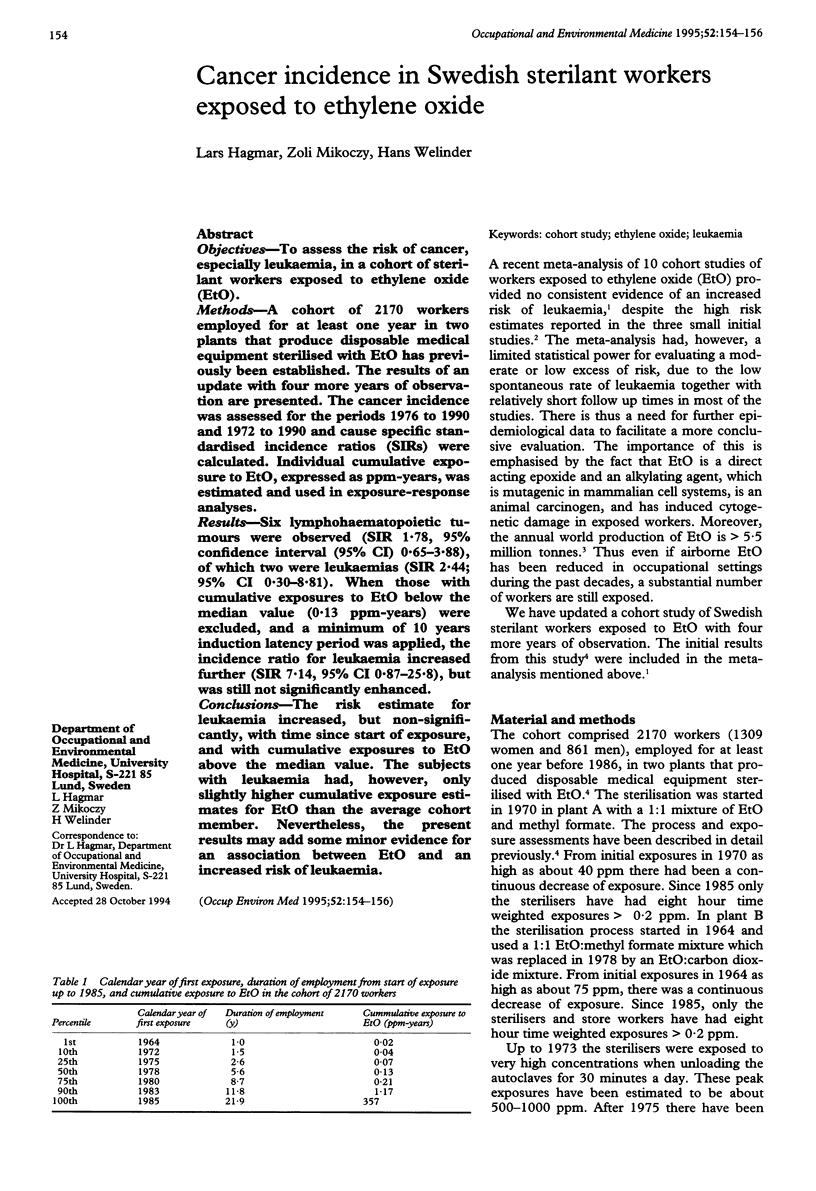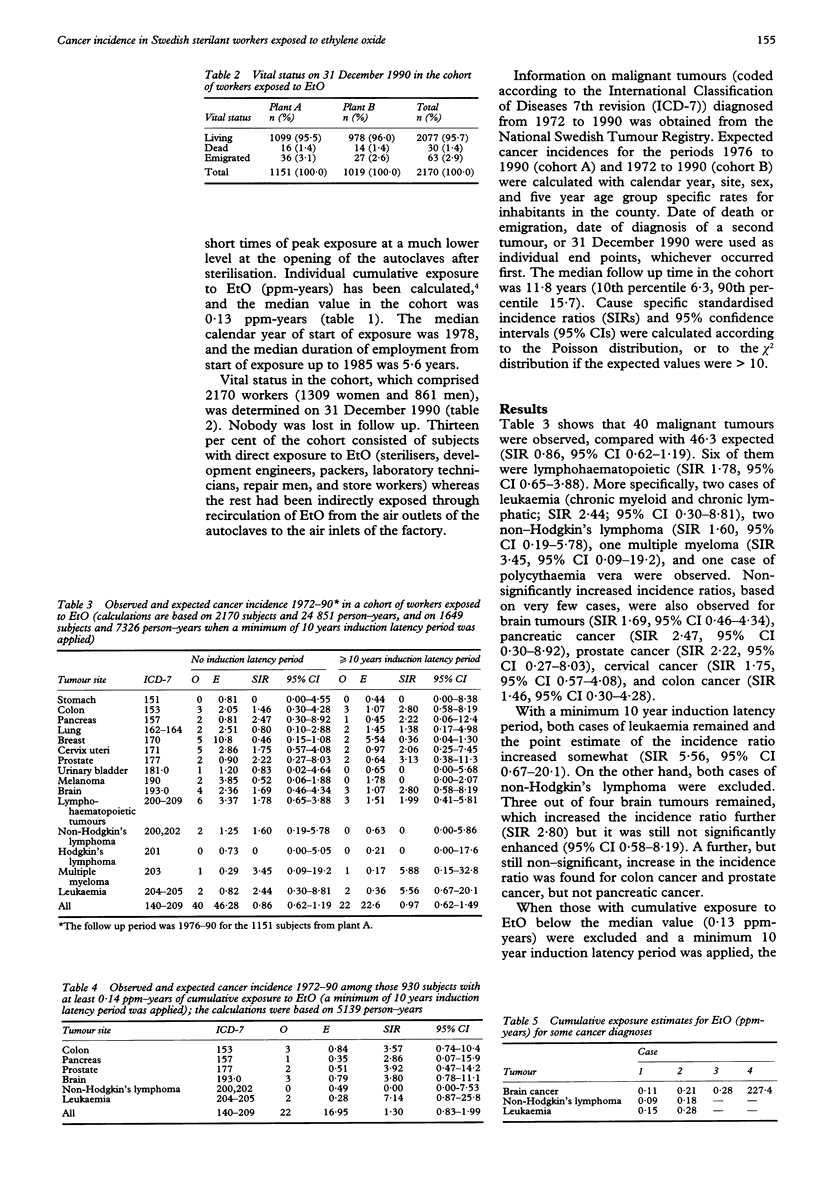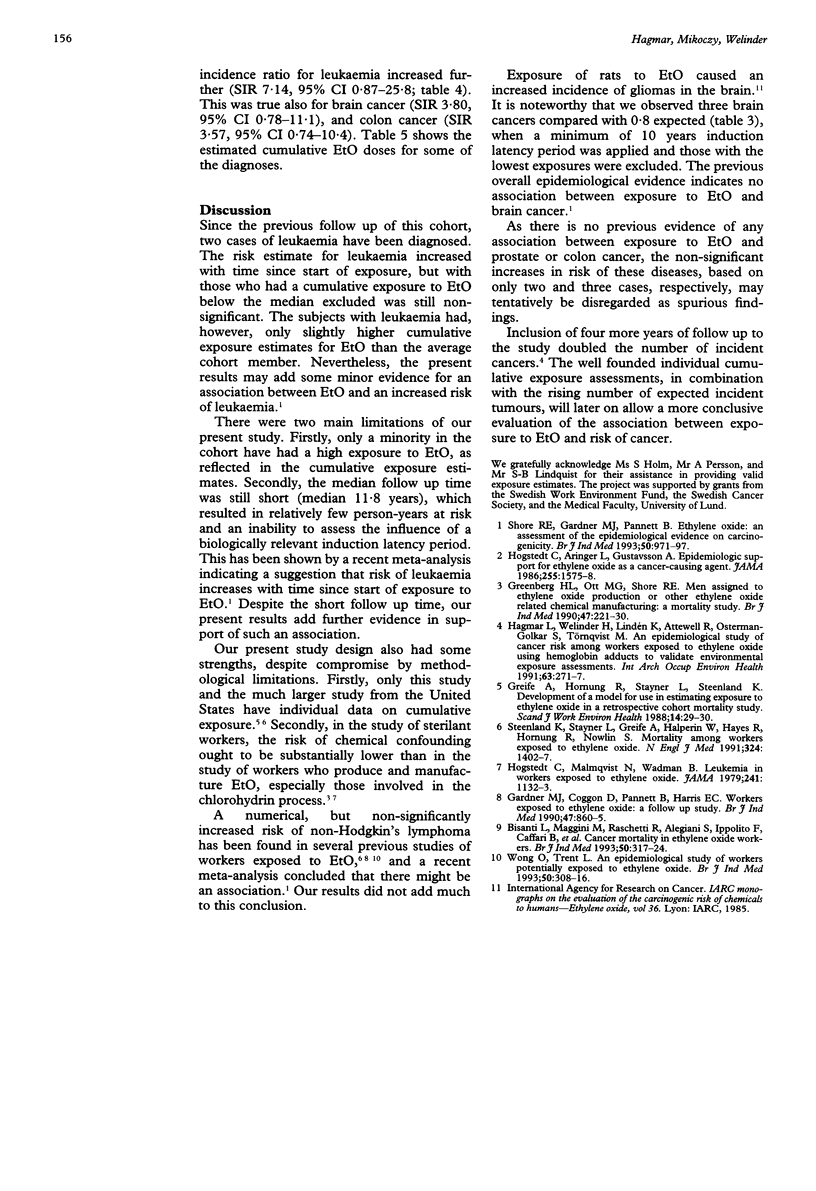Abstract
OBJECTIVES--To assess the risk of cancer, especially leukaemia, in a cohort of sterilant workers exposed to ethylene oxide (EtO). METHODS--A cohort of 2170 workers employed for at least one year in two plants that produce disposable medical equipment sterilised with EtO has previously been established. The results of an update with four more years of observation are presented. The cancer incidence was assessed for the periods 1976 to 1990 and 1972 to 1990 and cause specific standardised incidence ratios (SIRs) were calculated. Individual cumulative exposure to EtO, expressed as ppm-years, was estimated and used in exposure-response analyses. RESULTS--Six lymphohaematopoietic tumours were observed (SIR 1.78, 95% confidence interval (95% CI) 0.65-3.88), of which two were leukaemias (SIR 2.44; 95% CI 0.30-8.81). When those with cumulative exposures to EtO below the median value (0.13 ppm-years) were excluded, and a minimum of 10 years induction latency period was applied, the incidence ratio for leukaemia increased further (SIR 7.14, 95% CI 0.87-25.8), but was still not significantly enhanced. CONCLUSIONS--The risk estimate for leukaemia increased, but non-significantly, with time since start of exposure, and with cumulative exposures to EtO above the median value. The subjects with leukaemia had, however, only slightly higher cumulative exposure estimates for EtO than the average cohort member. Nevertheless, the present results may add some minor evidence for an association between EtO and an increased risk of leukaemia.
Full text
PDF


Selected References
These references are in PubMed. This may not be the complete list of references from this article.
- Bisanti L., Maggini M., Raschetti R., Alegiani S. S., Ippolito F. M., Caffari B., Segnan N., Ponti A. Cancer mortality in ethylene oxide workers. Br J Ind Med. 1993 Apr;50(4):317–324. doi: 10.1136/oem.50.4.317. [DOI] [PMC free article] [PubMed] [Google Scholar]
- Greenberg H. L., Ott M. G., Shore R. E. Men assigned to ethylene oxide production or other ethylene oxide related chemical manufacturing: a mortality study. Br J Ind Med. 1990 Apr;47(4):221–230. doi: 10.1136/oem.47.4.221. [DOI] [PMC free article] [PubMed] [Google Scholar]
- Greife A. L., Hornung R. W., Stayner L. G., Steenland K. N. Development of a model for use in estimating exposure to ethylene oxide in a retrospective cohort mortality study. Scand J Work Environ Health. 1988;14 (Suppl 1):29–30. [PubMed] [Google Scholar]
- Hagmar L., Welinder H., Lindén K., Attewell R., Osterman-Golkar S., Törnqvist M. An epidemiological study of cancer risk among workers exposed to ethylene oxide using hemoglobin adducts to validate environmental exposure assessments. Int Arch Occup Environ Health. 1991;63(4):271–277. doi: 10.1007/BF00386377. [DOI] [PubMed] [Google Scholar]
- Hogstedt C., Aringer L., Gustavsson A. Epidemiologic support for ethylene oxide as a cancer-causing agent. JAMA. 1986 Mar 28;255(12):1575–1578. [PubMed] [Google Scholar]
- Hogstedt C., Malmqvist N., Wadman B. Leukemia in workers exposed to ethylene oxide. JAMA. 1979 Mar 16;241(11):1132–1133. [PubMed] [Google Scholar]
- Shore R. E., Gardner M. J., Pannett B. Ethylene oxide: an assessment of the epidemiological evidence on carcinogenicity. Br J Ind Med. 1993 Nov;50(11):971–997. doi: 10.1136/oem.50.11.971. [DOI] [PMC free article] [PubMed] [Google Scholar]
- Steenland K., Stayner L., Greife A., Halperin W., Hayes R., Hornung R., Nowlin S. Mortality among workers exposed to ethylene oxide. N Engl J Med. 1991 May 16;324(20):1402–1407. doi: 10.1056/NEJM199105163242004. [DOI] [PubMed] [Google Scholar]
- Wong O., Trent L. S. An epidemiological study of workers potentially exposed to ethylene oxide. Br J Ind Med. 1993 Apr;50(4):308–316. doi: 10.1136/oem.50.4.308. [DOI] [PMC free article] [PubMed] [Google Scholar]


